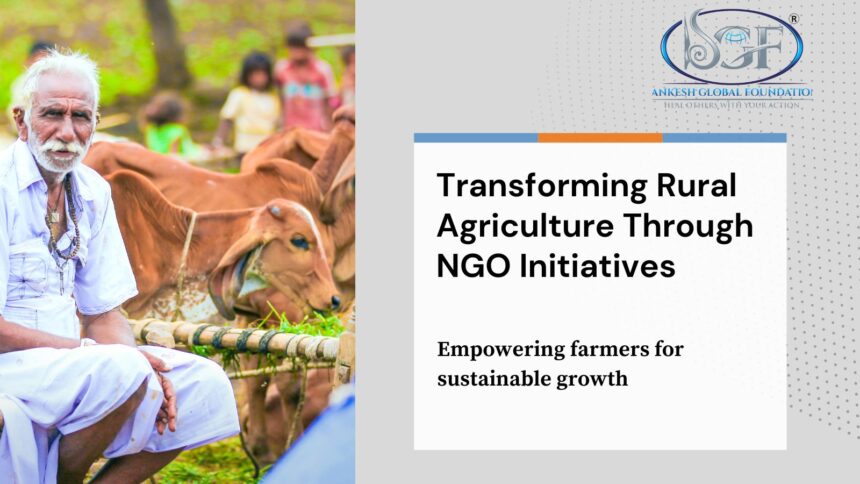In the vast tapestry of rural India, where agriculture forms the backbone of livelihoods, Non-Governmental Organizations (NGOs) have emerged as catalysts for change, driving initiatives that promote sustainable agricultural practices. These NGOs play a crucial role in addressing challenges faced by farmers, ranging from resource constraints to environmental sustainability.
This article delves into the noteworthy efforts undertaken by NGOs in India to empower rural communities, enhance agricultural productivity, and foster sustainable practices.
Empowering Farmers through Education:
The NGOs in India are at the forefront of educational initiatives aimed at empowering farmers with knowledge and skills. Recognizing that informed decisions lead to sustainable practices, these organizations conduct workshops, training programs, and awareness campaigns.
Topics often include modern farming techniques, efficient water management, organic farming, and the prudent use of fertilizers and pesticides. By imparting practical insights, NGOs enable farmers to make informed choices that enhance crop yields and reduce environmental impact.
Natural Resource Management:
Sustainable agriculture relies heavily on the responsible management of natural resources. The NGOs in India actively engages in projects focused on water conservation, soil health, and biodiversity preservation. These initiatives aim to mitigate the adverse effects of climate change, erratic rainfall, and depleting soil fertility.
Through community-driven efforts, NGOs facilitate the adoption of conservation methods such as rainwater harvesting, afforestation, and crop diversification, ensuring the long-term resilience of rural farming communities.
Promoting Organic Farming:
The shift towards organic farming is a pivotal aspect of sustainable agriculture, and NGOs in India are instrumental in promoting and supporting this transition. Recognizing the environmental and health benefits of organic practices, these organizations provide training on organic farming methods, facilitate access to organic inputs, and connect farmers with markets that value organic produce.
By championing the organic movement, NGOs contribute to the reduction of chemical inputs, preservation of soil health, and the overall well-being of rural communities.
Technology Adoption for Precision Farming:
NGOs play a vital role in bridging the technological divide in rural India by introducing farmers to modern agricultural technologies. Precision farming, facilitated by the use of advanced tools and techniques, optimizes resource utilization and minimizes environmental impact.
NGOs collaborate with technology providers to train farmers in the use of drones, sensors, and data analytics for precise irrigation, crop monitoring, and pest management. This integration of technology enhances productivity while minimizing the ecological footprint of agriculture.
Microfinance and Livelihood Diversification:
NGOs recognize the economic challenges faced by farmers and often initiate microfinance programs to provide financial support. By offering low-interest loans, these organizations empower farmers to invest in sustainable practices, purchase quality seeds, and adopt new technologies.
Moreover, NGOs encourage livelihood diversification by promoting activities such as apiculture, sericulture, and animal husbandry. This diversification not only enhances income streams for farmers but also contributes to the overall resilience of rural economies.
Women’s Empowerment in Agriculture:
NGOs in India are actively involved in promoting gender-inclusive approaches to sustainable agriculture. Recognizing the crucial role women play in farming activities, these organizations implement projects that empower women with knowledge, skills, and access to resources.
By fostering women’s participation in decision-making processes and providing training in sustainable farming practices, NGOs contribute to the creation of more resilient and equitable agricultural communities.
Market Linkages and Fair Trade:
Ensuring fair market access is a critical component of sustainable agriculture. The NGOs in India facilitate market linkages for farmers, connecting them with buyers who value and support sustainable practices.
By promoting fair trade principles, these organizations empower farmers to receive equitable compensation for their efforts, fostering a more sustainable and ethical agricultural supply chain.
Conclusion:
In the vast expanse of rural India, where agriculture is not just a profession but a way of life, NGOs emerge as beacons of hope and change. Their initiatives in promoting sustainable agriculture go beyond immediate gains, laying the foundation for resilient and thriving rural communities.
By empowering farmers with knowledge, fostering responsible resource management, and facilitating market linkages, NGOs in India play a pivotal role in shaping a future where agriculture is not only productive but also sustainable and equitable.
One notable example is the Sankesh Global Foundation, a beacon of sustainable change in India. Through focused initiatives in education, resource management, technology adoption, and market linkages, the foundation empowers rural communities and promotes sustainable agricultural practices.
Their commitment to fair trade and women’s empowerment exemplifies the transformative impact of NGOs, shaping a more sustainable and resilient future for rural India.

